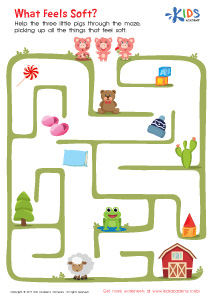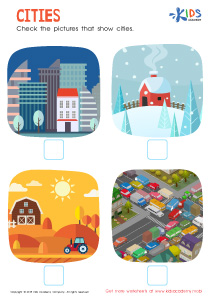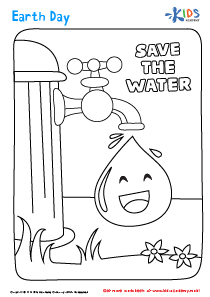World around Us Quizzes for 4-Year-Olds
3 results
3 filtered results
Clear all filters3 filtered results
-
From - To
Explore and Learn: World Around Us for 4-Year-Olds
Dive into the wonders of the world with our interactive assessment quizzes designed specifically for 4-year-olds! These vibrant, engaging quizzes not only test knowledge but also provide instant feedback to encourage and support your child's learning journey. Each quiz in our "World around Us for 4-Year-Olds" series is crafted to spark curiosity and enhance understanding of the environment, animals, plants, and everyday phenomena. Watch as your child discovers new facts, develops critical thinking skills, and grows in confidence with each quiz. Perfect for inquisitive young minds ready to explore the world around them!
In an ever-evolving educational landscape, interactive quizzes on the World around Us have emerged as a powerful tool in fostering the intellectual growth of young minds, particularly for 4-year-olds. These assessment quizzes, designed with the curiosity and developmental stage of 4-year-olds in mind, offer a unique blend of learning and play, making them an invaluable resource in a child's educational journey.
Understanding the World around Us for 4-Year-Olds can sometimes be a challenging endeavor. At this tender age, children are at a critical stage of development, where their cognitive, emotional, and social abilities are rapidly expanding. They possess an innate curiosity about the world around them, constantly asking questions and seeking answers. This is where interactive quizzes on the World around Us come into play, turning their curiosity into a fun and engaging learning experience.
These quizzes are specifically designed to cater to the learning needs and abilities of 4-year-olds. They cover a wide range of topics from nature, animals, and the environment to basic science concepts, all tailored to be understandable and interesting for young learners. The interactive element of these quizzes ensures that children are not just passive recipients of information but active participants in their learning process. This interactive engagement is crucial for children's learning at this age, as it helps to cement information in their memory more effectively than traditional learning methods.
Moreover, the assessment aspect of these quizzes offers a clear insight into what children understand and where they might need further support. This is incredibly beneficial for parents and educators in tailoring future learning experiences to address these gaps. For 4-year-olds, these quizzes act as a gentle introduction to the concept of assessment, without the pressure and stress that traditional testing methods might evoke. This positive introduction to assessment can help to foster a healthy attitude towards learning and testing as they progress through their educational journey.
The benefits of these interactive quizzes on the World around Us for 4-Year-Olds extend beyond just cognitive development. They also play a significant role in enhancing fine motor skills through the action of clicking, dragging, and typing, depending on the quiz format. Moreover, these quizzes can support the development of social skills. For instance, when children take these quizzes in a group setting, they learn about taking turns, sharing their thoughts, and collaborating with their peers to find answers.
In conclusion, interactive quizzes on the World around Us for 4-Year-Olds stand out as a significant educational tool that makes learning a fun, engaging, and fruitful experience. Through these quizzes, children can explore and understand the world around them in a manner that resonates with their stage of development. They offer a foundation not only for academic success but also for developing a lifelong love for learning. As we continue to explore innovative educational tools, the role of interactive assessments in early childhood education cannot be underestimated, marking a positive step towards a more inclusive and interactive learning environment for all children.











